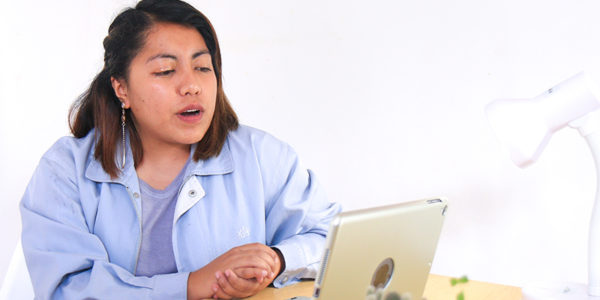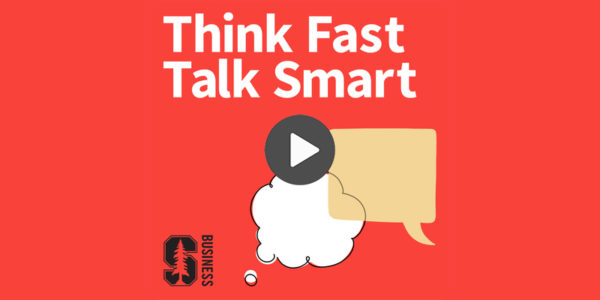Prof. Jeff Hancock, Prof. Jeremy Bailenson and colleagues find that women report feeling more exhausted than men following video calls – and the “self-view” display may be to blame.
Communication in the News
Atlas of AI: Power, Politics, and the Planetary Costs of Artificial Intelligence
Join Prof. Fred Turner in conversation with Kate Crawford about her new book, Atlas of AI, on Monday, April 12 . Please register in advance.
Can AI Mediate Communication? Understanding AI in Human-to-Human Interaction
Join Prof. Jeff Hancock in a Northeastern University Information Ethics Roundtable to be held on Thursday, April 8. Please register in advance.
Marion Lewenstein, Stanford professor of communication (teaching), emerita, has died at 93
During her Stanford career, pioneering journalist and journalism teacher Marion Lewenstein was awarded a Dinkelspiel Award for Outstanding Service to Undergraduate Education and served as academic secretary of the Faculty Senate.
Faculty deliberation supports proposals for new school focused on climate and sustainability
Faculty participated in a event involving Deliberative Polling, a technique developed by Prof. James Fishkin.
Causes for ‘Zoom fatigue’ and their simple fixes
Prof. Jeremy Bailenson’s research shows that popular video chat platforms have design flaws that exhaust the human mind and body.
AI-Mediated Communication
Prof. Jeff Hancock reports on several studies and lays out some theoretical roadmaps to guide our future thinking on understanding AI-mediated communication.
How to depolarize America
Prof. James Fishkin and colleague Prof. Larry Diamond have been refining a method called Deliberative Polling® that brings people from varied backgrounds together for an informed and moderated discussion.
Prof. Jennifer Pan on China’s Social Assistance
What are the costs of the Chinese regime’s fixation on quelling dissent in the name of political order, or “stability?”. Video from the USC U.S.-China Institute.
Psychology Trumps Technology: How to Express Yourself and Truly Connect With Others Online
Matt Abrahams sits down with Prof. Jeff Hancock, to talk about the communication tendencies, styles, and mistakes of social media users.
The Digital Dilemma in the Time of COVID
CASBS Webcast featuring Nilam Ram, Byron Reeves, Abby Smith Rumsey, and Maryanne Wolf in conversation with John Markoff.
Predicting, Policing, Prescribing Criminality
Columbia University’s Sociology of Algorithms workshop panel featuring Angèle Christin, Sarah Brayne, Andrew Guthrie Ferguson, and Kristian Lum with Gil Eyal.
How to counter the misinformation that deceives and incites Americans
Lecturer Janine Zacharia says the information environment you reside in shapes — and often mirrors — your personal worldview. And most Trump voters inhabit an information ecosystem dominated by Fox News.
These Americans Tried to Listen to One Another. A Year Later, Here’s How They’re Voting
Participants in Prof. James Fishkin’s America in One Room experiment were asked what they think about the 2020 presidential election.
What Drives Voter Behavior?
In this APA Speaking of Psychology podcast, Prof. Jon Krosnick discusses the psychological forces at play when people decide whether to vote and whom to vote for.
The debate was one long negative ad. Undecided voters will walk away
Research by Prof. Shanto Iyengar and colleague shows that negativity polarizes party members and alienates moderates.
The Riches of This Land: The Untold, True Story of America’s Middle Class
Jim Tankersley in conversation with Janine Zacharia. Watch the video.
Navigating U.S.-China Technology Futures
In this FSI Stanford video, Prof. Jennifer Pan discusses her longitudinal study of Chinese students in the U.S.
Whose America Is It?
Prof. Shanto Iyengar says “A less than decisive Biden victory, coupled with Republicans’ willingness to accept Trump’s claims, may result in widespread protests and unrest.”.
Climate Is Taking On a Growing Role for Voters, Research Suggests
Concern about global warming is steady despite other crises, a survey by Prof. Jon Krosnick and Bo MacInnis found, and the number of voters who are deeply engaged on the issue is rising sharply.
Should journalists rethink objectivity?
Dept. of Communication faculty weigh in.
During the pandemic, screen time is erasing the line between smartphones and reality
Prof. Byron Reeves says “The boundary between the smartphone and the real world is just crumbling”.
California requires masks, but not everyone wears one. Here’s how to fix that
Prof. Jon Krosnick says “you need to emphasize individual risk” as one tactic, adding that people must be convinced that they could actually die or become severely ill from the virus.
Racism Makes Chinese Students in U.S. More Likely to Support Beijing
Prof. Jennifer Pan and colleagues have shown that discrimination against Chinese students in the U.S. may be making them more supportive of the nationalism and authoritarian rule practiced by the regime in Beijing.
Mobilizing to fight COVID-19
Cheryl Phillips’ Big Local News team have been collecting, processing and releasing data sets that journalists can use in their coverage of the pandemic.
Work and a desire to exercise, socialize are why people didn’t social distance
An interdisciplinary team from the Dept. of Communication and the Dept. of Epidemiology reveals reasons why people failed to comply to social distancing guidelines.
Why Zoom Meetings Can Exhaust Us
In this WSJ article, Prof. Jeremy Bailenson discusses why many of us are getting mentally exhausted from videoconferencing—whether for a work meeting, an online dance class, or a virtual happy hour.
Journalists must understand provenance, motivation when reporting disinformation
Janine Zacharia and colleague Andrew Grotto discuss strategies for reporters and editors to write about disinformation, leaked material and propaganda in a responsible and timely way.
People’s uncertainty about the novel coronavirus can lead them to believe misinformation
Check health-related information about the coronavirus from established news sources rather than from shared stories in social media, advises Prof. Jeff Hancock.
Social media and virtual social gatherings can help us navigate the Coronavirus crisis
In TIME and The Atlantic articles, Prof. Jeff Hancock discusses the impact of social media during the crisis and the benefits of virtual meals with friends.
Nature Podcast: Improving measurements of online activity
Prof. Byron Reeves discusses his human “screenome” project with Nick Howe.
Prof. James Hamilton and Prof. Jon Krosnick discuss journalism and democracy in lead up to Super Tuesday
In a complex news environment, Communication professors urge voters to be careful consumers of political information and to think hard about where information comes from and how it reaches them.
Rebele Symposium: Meet the Press
The 2020 Rebele Symposium – held the day after Super Tuesday – focuses on swing-state coverage of the presidential election and features reporters from Pennsylvania, Wisconsin, Michigan and Florida. Watch the video.
54th Carlos Kelly McClatchy Symposium
A Conversation about the New York Times 1619 Project. Featuring New York Times correspondent Nikole Hannah-Jones and writer Kiese Laymon. Moderated by JSK managing director Michael Bolden. Watch the video.
Researchers call for a Human Screenome Project that will provide a detailed approach to observing the complexities of current digital lives
Prof. Byron Reeves and colleagues say that we need to move beyond measures of screen time, and record and analyze everything people see and do on their devices.
It’s not your phone, it’s you
Prof. Gabriella Harari finds that it’s personality that influences how people use their digital devices; technology is just a medium to channel our everyday behavior.
Taking virtual reality for a test drive
The New Yorker’s Patricia Marx visits Prof. Jeremy Bailenson’s Virtual Human Interaction Lab
Search results not biased along party lines, Social Media Lab scholars find
“Our data suggest that Google’s search algorithm is not biased along political lines, but instead emphasizes authoritative sources,” said Prof. Jeff Hancock.
Federal judge declares Florida ballots unconstitutional, orders change
Prof. Jon Krosnick testified about how the primacy effect can influence election outcomes.
The ways climate scientists explain their predictions about the impact of global warming can either promote or limit their persuasiveness
Research by Prof. Jon Krosnick and colleagues shows how uncertainty in scientific predictions can help and harm credibility.








































